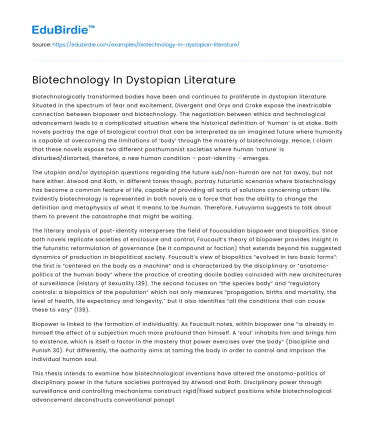Biotechnologically transformed bodies have been and continues to proliferate in dystopian literature. Situated in the spectrum of fear and excitement, Divergent and Oryx and Crake expose the inextricable connection between biopower and biotechnology. The negotiation between ethics and technological advancement leads to a complicated situation where the historical definition of ‘human’ is at stake. Both novels portray the age of biological control that can be interpreted as an imagined future where humanity is capable of overcoming the limitations of ‘body’ through the mastery of biotechnology. Hence, I claim that these novels expose two different posthumanist societies where human ‘nature’ is disturbed/distorted, therefore, a new human condition – post-identity – emerges.
The utopian and/or dystopian questions regarding the future sub/non-human are not far away, but not here either. Atwood and Roth, in different tones though, portray futuristic scenarios where biotechnology has become a common feature of life, capable of providing all sorts of solutions concerning urban life. Evidently biotechnology is represented in both novels as a force that has the ability to change the definition and metaphysics of what it means to be human. Therefore, Fukuyama suggests to talk about them to prevent the catastrophe that might be waiting.
Save your time!
We can take care of your essay
- Proper editing and formatting
- Free revision, title page, and bibliography
- Flexible prices and money-back guarantee
The literary analysis of post-identity intersperses the field of Foucauldian biopower and biopolitics. Since both novels replicate societies of enclosure and control, Foucault’s theory of biopower provides insight in the futuristic reformulation of governance (be it compound or faction) that extends beyond his suggested dynamics of production in biopolitical society. Foucault’s view of biopolitics “evolved in two basic forms”: the first is “centered on the body as a machine” and is characterized by the disciplinary or “anatomo-politics of the human body” where the practice of creating docile bodies coincided with new architectures of surveillance (History of Sexuality 139). The second focuses on “the species body” and “regulatory controls: a biopolitics of the population” which not only measures “propagation, births and mortality, the level of health, life expectancy and longevity,” but it also identifies “all the conditions that can cause these to vary” (139).
Biopower is linked to the formation of individuality. As Foucault notes, within biopower one “is already in himself the effect of a subjection much more profound than himself. A ‘soul’ inhabits him and brings him to existence, which is itself a factor in the mastery that power exercises over the body” (Discipline and Punish 30). Put differently, the authority aims at taming the body in order to control and imprison the individual human soul.
This thesis intends to examine how biotechnological inventions have altered the anatomo-politics of disciplinary power in the future societies portrayed by Atwood and Roth. Disciplinary power through surveillance and controlling mechanisms construct rigid/fixed subject positions while biotechnological advancement deconstructs conventional panopticon and expands beyond visible institutional walls/borders/fences by linking these bodies to dispersed technological networks capable of programming new forms of hybrid subjectivity – the Crakers or the Dauntless army.
Apart from sorting and labeling, abandonment is another important feature. The ‘brain-dead’ Dauntless army is useful to Jeanine and Dauntless leaders because they have no willpower to resist and will follow the authoritative orders unquestioningly. Jeanine wants to be gain power because it is precisely biopower that allows governments to determine which faction to invest in and which to abandon. Since Jeanine wants to get rid of the factionless and Abnegation, using bioweapon against them seems convenient to her.
Moreover, the human-machine hybrid body or tech-nobody encounters abandonment due to their ‘less-than-human’ status compared to ‘complete’ human beings. Neither Tris nor Four bothers about their ‘sleepwalking’ friends who, under simulation serum, killed innocent Abnegation members. Tris chose to kill Will and hopes she would never meet Christina because her “Candor trained eye will see” that Tris murdered Will. In contrast, human-animal hybrid or tech-nobody is treated better because they replicate ‘human essence’ better than the army. Thus, Jimmy tries his best to protect the Crakers, even after knowing about the existence of three other ‘complete’ human beings.
Wolfe highlights Foucault’s analysis of “the human” as a historical form of subjectivity which is closely connected to the technospecific industrialization and discipline. Alternatively, posthumanism is the “embedded and embodied” condition of life within “technical, medical, informatic, and economic networks,” that is derived, first and foremost, from the biopolitical institutions: “posthumanism names a historical moment in which the decentering of the human by its imbrication in technical, medical, informatic, and economic networks is increasingly impossible to ignore, a historical development that points toward the necessity of new theoretical paradigms (but also thrusts them on us), a new mode of thought that comes after the cultural repressions and fantasies, the philosophical protocols and evasions, of humanism as a historically specific phenomenon” (Wolfe xv-xvi).
I examine techno-body as the product of the postindustrial form of biological and technological embodiment.
Looking at biotechnology as an entanglement of the bodies within “technical, medical, informatics, and economic networks” helps to understand why it is used in biopwer: it marks the integration of anatomo-politics of the individual and the population. Consequently, biotechnology produces strange, hybrid, subjectivities – the animal-human hybrid who awakens to the already pervasive forms of symbiogenesis and interspecies mixing that link species on the evolutionary tree of life.
Divergent is thoroughly dystopian, and redemptive in tone because biotechnology is almost exclusively presented as a threat to human freedom, identity and safety, and it highlights the mistakes made by the faction members who hopelessly fail to restore peace. There is no room for the positive representation of human/non-human commingling in Roth’s posthumanist vision. Roth expresses intense technophobia, analyzes the apparent danger of using biotechnology as a biopolitical tool of repression. She also highlights that Divergent rebels are unique as their human ‘nature’ cannot be fully subjected to the control of technospecific society.






 Stuck on your essay?
Stuck on your essay?

